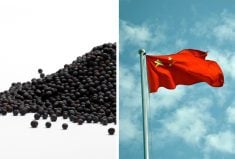Saskatchewan agriculture officials are meeting today with federal agriculture minister Gerry Ritz and federal transport minister Lisa Raitt to express their concern about Bill C-30.
The Fair Rail for Grain Farmers Act unveiled yesterday in Ottawa does not meet all of the province’s expectations, said agriculture minister Lyle Stewart.
He sent a letter to Ritz and Raitt outlining his disappointment and was scheduled to meet with them this afternoon. Industry officials including Franck Groeneweg, chair of SaskCanola, and the president and vice-president of Saskatchewan Association of Rural Municipalities, David Marit and Ray Orb, were also involved in the meeting.
Read Also

Canada and China discuss disputes over canola and EVs, says Ottawa
Senior Canadian and Chinese officials discussed bilateral trade disputes involving canola and electric vehicles on Friday, Ottawa said, but gave no indication of any immediate breakthrough.
Stewart said most believed the legislative solution was going to be long term after the initial order in council. Instead, the amendments to the Canada Grain Act and the Canada Transportation Act contain a sunset clause that takes effect August 2016.
“It can be renewed by the government in power at their whim but that doesn’t give much of a sense of security to producers or shippers and I don’t think it gives much guidance to railways as to what they really need to do as far as reinvesting in equipment and rolling stock and that sort of thing, so I think that to us is a substantial deficiency,” he told reporters before his meeting.
The Saskatchewan industry was also disappointed that the penalties for non-performance by the railways and weekly tonnage minimums weren’t hiked.
Asked if legislation could address his concerns plus those of the railways — CN, for example, called it heavy-handed — Stewart said he doesn’t favour a softer position for the railways.
“I think the railways came out the big winners in this piece as it is,” he said.
Groeneweg characterized the amendments as an extension of the order in council and said he hoped more details would come through regulation.
He said the sunset clause might make it look like the situation is fixed, but in reality it might just be a Band-Aid. All commodity shippers have a vested interest in a well-run transportation system, he said.
“We want to grow the pie bigger, not fight over the pieces here,” he said. “As a producer, I know to have a very good rail industry or rail service in the future it’s going to take the co-ordination of the whole industry.”
Groeneweg said problems occur every five to 10 years and they always rest on the railways’ performance.
“When are we going to have a state-of-the-art system that’s going to move our products … so we have a strong economy?” he said.
The more commodities the railways haul the more money they make, he added.
“So why are the railways just dragging their feet?”
Groeneweg farms near Edgeley, Sask., and said he signed contracts in September for January delivery that haven’t yet been honoured. Bills have to be paid and this year’s crop has to be planted.
“It’s a problem,” he said. “I don’t know how many people would want to wait on that kind of income.”
Marit said increasing production of all types of commodities is a concern.
“We have to have some way of getting some handle on movement of grain products through the Prairies and to port,” he said. “Either we find other mechanisms, whether it’s through the U.S., but we’ve got to increase the flow of agriculture products out of this province.”
Marit, who is also president of the short-line Fife Lake Railway, said he sees some opportunity in the rumoured expansion of Burlington Northern Santa Fe railway into Saskatchewan to move more grain south.
“Right now from us (Fife Lake line) to hook to Burlington Northern is 31 kilometres,” he said.
An expansion would allow access to about 645 km of short-line rail and Saskatchewan grain and oil.
Marit said truck traffic is too expensive for farmers and would require roads that can handle heavier weights.















